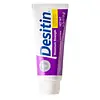What's inside
What's inside
 Key Ingredients
Key Ingredients

 Benefits
Benefits

 Concerns
Concerns

 Ingredients Side-by-side
Ingredients Side-by-side

Zinc Oxide
Cosmetic ColorantPrunus Amygdalus Dulcis Oil
Skin ConditioningCera Alba
EmollientLanolin
EmollientRicinus Communis Seed Oil
MaskingSimmondsia Chinensis Seed Oil
EmollientButyrospermum Parkii Butter
Skin ConditioningGlyceryl Rosinate
PerfumingOlea Europaea Fruit Oil
MaskingHydrogenated Castor Oil
EmollientOlea Europaea Oil Unsaponifiables
Skin ConditioningAnthemis Nobilis Flower Oil
MaskingLavandula Angustifolia Flower
Skin ConditioningLavandula Hybrida Oil
EmollientCalendula Officinalis Flower Extract
MaskingRosmarinus Officinalis Leaf Extract
AntimicrobialTocopherol
AntioxidantGlycine Soja Oil
EmollientCanola Oil
EmollientLimonene
PerfumingLinalool
PerfumingGeraniol
PerfumingZinc Oxide, Prunus Amygdalus Dulcis Oil, Cera Alba, Lanolin, Ricinus Communis Seed Oil, Simmondsia Chinensis Seed Oil, Butyrospermum Parkii Butter, Glyceryl Rosinate, Olea Europaea Fruit Oil, Hydrogenated Castor Oil, Olea Europaea Oil Unsaponifiables, Anthemis Nobilis Flower Oil, Lavandula Angustifolia Flower, Lavandula Hybrida Oil, Calendula Officinalis Flower Extract, Rosmarinus Officinalis Leaf Extract, Tocopherol, Glycine Soja Oil, Canola Oil, Limonene, Linalool, Geraniol
Ingredients Explained
These ingredients are found in both products.
Ingredients higher up in an ingredient list are typically present in a larger amount.
Lanolin is a wax secreted by animals with wool, such as sheep. It is a waterproof emollient.
Emollients help soften and moisturize the skin by creating a film. This film prevents moisture from escaping, helping the skin stay hydrated.
Unlike true fats, lanolin contains sterol esters instead of glycerides. It also contains fatty acids and alcohols.
Because lanolin comes from an animal, it is not considered vegan. Sheep secrete lanolin through sebaceous glands to help protect their skin from the environment.
The answer to this question depends on the brand itself. Being cruelty-free means a brand does not experiment or harm animals. We recommend looking into how brands source their lanolin. Lanolin is cruelty-free if it is gathered without harming the animal.
Learn more about LanolinZinc Oxide is a mineral broad-spectrum UV filter; it is the broadest UVA and UVB reflector approved by the FDA. It also has skin protectant and skin soothing properties.
Zinc oxide is one of the most effective broad-spectrum UV filters. It protects against UVB, UVAII, and UVAI. In comparison to its counterpart titanium dioxide, zinc oxide provides uniform and extended UVA protection.
Another great benefit? This ingredient is highly photostable so it won't degrade easily under sunlight.
A common myth is that mineral UV filters are widely believed to primarily reflect UV light.
However, modern research shows titanium dioxide absorbs UV radiation like chemical filters (~95% absorption & 5% reflection).
Zinc oxide has great skin soothing properties so you'll likely find this in sunscreens formulated for sensitive skin or babies/children. It is unlikely to cause "eye sting" like other sunscreen ingredients.
Regulatory agencies consider zinc oxide to be non-toxic and safe. It has also been shown to not penetrate the skin.
Unfortunately, this ingredient does leave a visible white cast. This is why mineral sunscreens are often less cosmetically elegant than chemical or hybrid ones.
In cosmetics, zinc oxide can be found in both non-nano and nano-sized forms. The nano version is used to reduce white cast and improve the texture of sunscreen formulas.
There are ongoing concerns surrounding nano-zinc oxide's impact on marine ecosystems and whether it can be absorbed into skin.
Regarding marine ecosystems and coral reefs, there is no conclusive evidence that any form of zinc oxide (or any other sunscreen ingredients) will cause harm. The science is still developing but many consumers are keeping a close eye on this issue.
Please note, many destinations have reef-safety sunscreen rules. For instance, the U.S. Virgin Islands advises all visitors to use non-nano mineral sunscreens.
There has also been some stir about whether micronized or nano zinc oxide has potential photoxicity and absorption through the skin/lungs.
An in-vitro (done in a test tube or petri dish) study demonstrated micronized zinc oxide to have potential phototoxicity. There's no need to fret; the EU Commission's Scientific Committee on Consumer Safety has stated, "The relevance of these findings needs to be clarified by appropriate investigations in vivo." Or in other words, further studies done on living organisms are needed to prove this.
Current research shows zinc oxide nanoparticles do not penetrate intact or sunburned skin. They either remain on the surface or in the outermost layer of dead skin (stratum corneum).
Zinc oxide is one of only two classified mineral UV filters with titanium dioxide being the other one.
Fun fact: Zinc has been used throughout history as an ingredient in paint and medicine. An Indian text from 500BC is believed to list zinc oxide as a salve for open wound. The Ancient Greek physician Dioscorides has also mentioned the use of zinc as an ointment in 1AD.
Learn more about Zinc Oxide